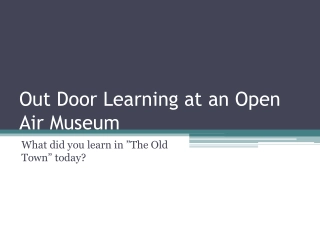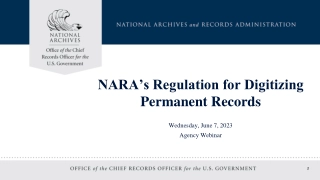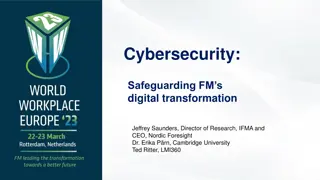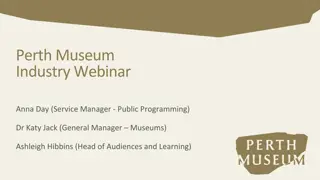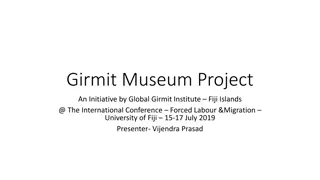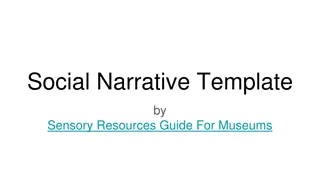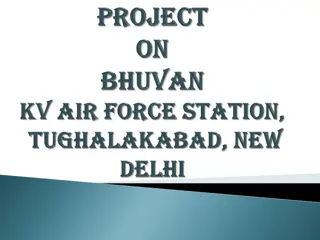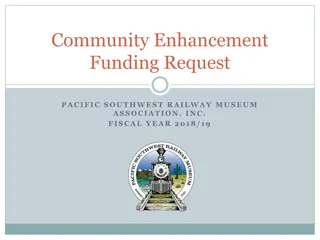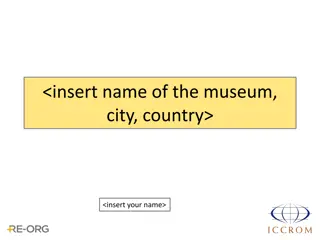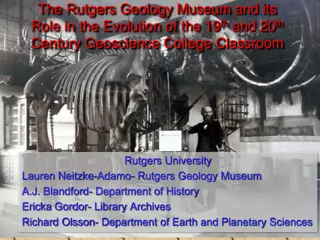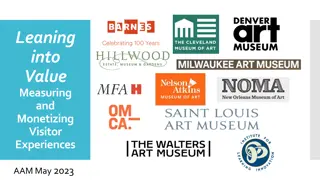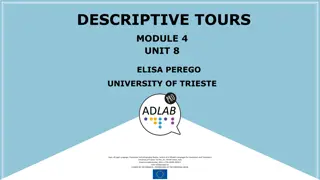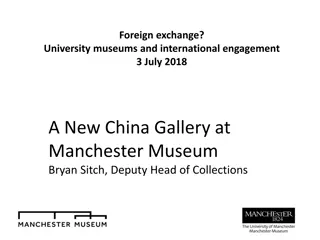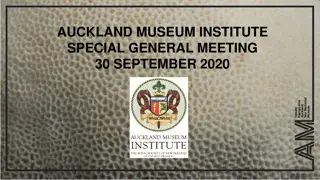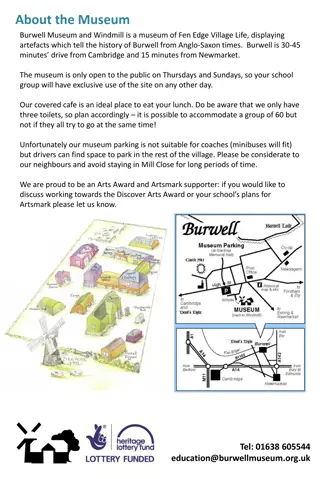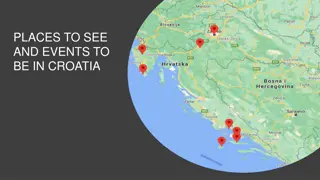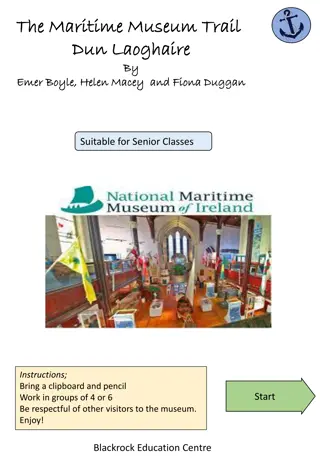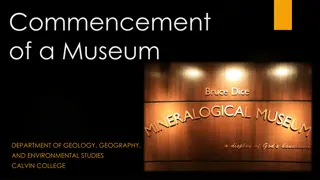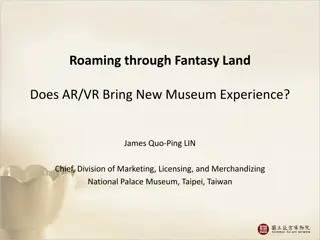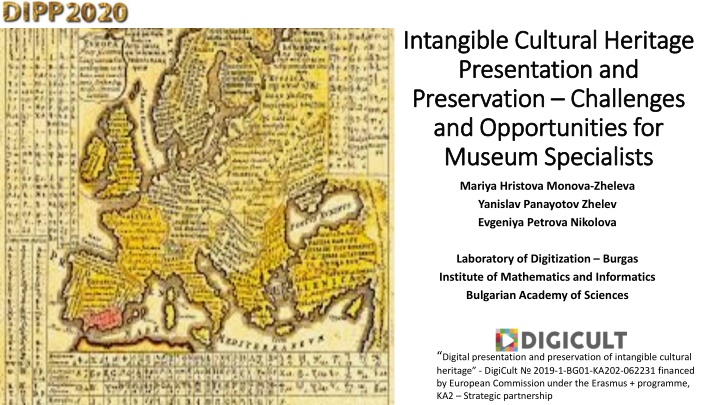
Challenges and Opportunities for Museum Specialists in Digitizing Cultural Heritage
This research project delves into the challenges and opportunities faced by museum specialists in digitizing intangible cultural heritage, presenting insights from Bulgaria, Greece, Italy, and Latvia. The study discusses the scope, methodology, and outcomes, shedding light on the education levels, subject areas of focus, and organizational affiliations of respondents in the field.
Download Presentation

Please find below an Image/Link to download the presentation.
The content on the website is provided AS IS for your information and personal use only. It may not be sold, licensed, or shared on other websites without obtaining consent from the author. If you encounter any issues during the download, it is possible that the publisher has removed the file from their server.
You are allowed to download the files provided on this website for personal or commercial use, subject to the condition that they are used lawfully. All files are the property of their respective owners.
The content on the website is provided AS IS for your information and personal use only. It may not be sold, licensed, or shared on other websites without obtaining consent from the author.
E N D
Presentation Transcript
Intangible Cultural Heritage Intangible Cultural Heritage Presentation and Presentation and Preservation Preservation Challenges and Opportunities for and Opportunities for Museum Specialists Museum Specialists Challenges Mariya Hristova Monova-Zheleva Yanislav Panayotov Zhelev Evgeniya Petrova Nikolova Laboratory of Digitization Burgas Institute of Mathematics and Informatics Bulgarian Academy of Sciences Digital presentation and preservation of intangible cultural heritage - DigiCult 2019-1-BG01-KA202-062231 financed by European Commission under the Erasmus + programme, KA2 Strategic partnership
Contents Introduction Scope and methodology of the research Experience in digitisation of culture heritage Conclusions
Introduction he paper present briefly the scope and methodology as well as the main results of research conducted in Bulgaria, Greece, Italy, and Latvia in the DigiCult project framework.
Scope and methodology of the research survey method 27 multiple choice questions and 8 open questions The questionnaire was answered by a total of 174 respondents from over 30 museums and cultural organisations in Bulgaria, Greece, Italy, and Latvia.
Scope and methodology of the research Q3. Please indicate your current education level Q4. What s the subject area of your diploma/degree? 100% None of the above PhD/ Post PhD 0% Bulgaria Latvia Italy Greece Master Other Tourism management/economics Digitization / ICT Cultural Management Museology Archaeology Social studies History of art Bachelor Diploma 0% 20% 40% 60% 80% Greece Italy Latvia Bulgaria Fig.1. Education level of respondents
Scope and methodology of the research Q6. What kind of organization do you work for? 100% 90% 80% 70% 60% 50% 40% 30% 20% 10% 0% Museum Government / Local authority Cultural organization (other than museum) Private business Creative industry Association related with heritage University Bulgaria Latvia Italy Greece Fig. 2.Respondents affiliations
Experience in digitisation of culture heritage Q9. Do you have previous experience in digitization? Q10. What kind of technology user are you? 54.17% 51.90% 60% 50% 72% 70.83% 80.00% 48.10% 46% 66.70% 65.40% 50% 39% 60.00% 40% 29.17% 27% 30% 40.00% 20% 10% 20.00% 0% 0.00% Bulgaria Latvia Italy Greece Bulgaria Latvia Italy Greece Yes, in another institution but not heritage related; Average computer user (office, mail, social media, etc) Yes, related with tangible heritage; Digital tools / equipment user (camera, drone, video / photo editing, etc) Specialist Yes, related with intangible heritage; No Fig. 3. Previous experience in digitization, kind of technology user
Experience in digitisation of culture heritage Q13. Do you know the legal framework for cultural heritage (tangible and intangible) in your country? 100.00% 80.00% 60.00% 92.60% 40.00% 65% 62.50% 59% 20.00% 0.00% Bulgaria Latvia Italy Greece Yes No Fig. 4. Knowledge of the legal framework for cultural heritage (tangible and intangible)
Experience in digitisation of culture heritage Q16. In your opinion which skills are underrepresented in your digital team? Social media E-communications Digital marketing Product management Content management E-commerce Multi-media production IP and rights management Digital design Technical leadership Web / app development Data management / analysis 0% 10% 20% 30% 40% 50% 60% Greece Italy Latvia Bulgaria Fig. 5. Underrepresented skills in digital teams
Experience in digitisation of culture heritage Q22. Are you aware if your country has adopted guidelines for the cataloguing, preservation and presentation of intangible assets? 100.00% 92.30% 75.00% 80.00% 65.50% 63% 60.00% 40.00% 20.00% 0.00% Bulgaria Latvia Italy Greece Yes No Fig. 6.The awareness on countries guidelines for the cataloguing, preservation and presentation assets adoption
Experience in digitisation of culture heritage Q23. Have you had the opportunity to work in the cataloguing of intangible assets? 120% 100% 95.83% 92.70% 100% 76.10% 80% 60% 40% 20% 0% Bulgaria Latvia Italy Greece Yes No Fig. 7. Previous experience in cataloguing of intangible assets
Experience in digitisation of culture heritage Q24. Does your organisation/institution have a written strategy for your ICH digital collection? 100.00% 80.00% 70.40% 80.500% 87.50% 60.00% 100.00% 40.00% 20.00% 0.00% Bulgaria Latvia Italy Greece Yes No Fig. 8. Existence of organisational/institutional strategy for ICH digital collection
Conclusions There is a need to build a knowledge base, to enhance the capacity and to strengthen the digital competencies of museum professionals for developing and implementing digitisation strategies for ICH artefacts based on common standards and approaches. The provision of relevant training in ICH digitization will contribute to overcoming common chal-lenges such as the digital shift and the need for encouragement of innovation in the cultural sector.
Laboratory of Digitization Burgas, Institute of Mathematics and Informatics, Bulgarian Academy of Sciences mariya@zhelev.com yanislav@zhelev.com evgeniyanikolova@gmail.com

